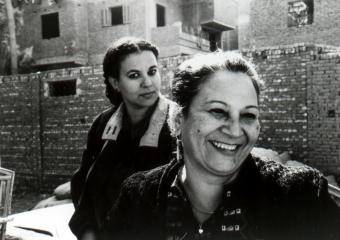 |
QUATRE FEMMES D'EGYPTE Vier Frauen aus Ägypten Four Women of Egypt Tahani Rached Kanada 1998 Produktion: National Film Board of Canada, Elixir Production. Weltvertrieb: National Film Board of Canada, P.O. Box 6100, Station Centre Ville, Montréal/Québec H3C 3H5, Kanada. Tel.: (1-514) 283 9439, Fax: (1-514) 496 1895. e-mail: j.leduc@nfb.ca Buch, Regie: Tahani Rached. Kamera: Jacques Leduc, Serge Lafortune. Recherche: Nancy Marcotte. Musik: Jean Derome. Ton: Serge Beauchemin. Schnitt: Fernand Bélanger, Zeina Mahmoud. Mischung: Serge Boivin. Produktion: Eric Michel. Mit: Safynaz Kazem, Wedad Mitry, Shahenda Maklad, Amina Rachid. Format: Video, Farbe. Länge: 90 Minuten. Sprache: Arabisch, Französisch, Englisch. |
Arsenal Di.16.02.1999 17.30 Arsenal Di.16.02.1999 24.00 |
|
| Vier ägyptische Frauen wagen es, den Begriff Toleranz neu zu definieren. Alle vier sind Freundinnen, die das gleiche Ziel vor Augen haben: die menschliche Würde. Sie sind erfüllt von der Liebe zu ihrem Land: sie haben alle noch Erinnerungen an die Herrschaft von König Faruk, hofften auf tiefgreifende Änderungen nach der Revolution von Nasser und kämpfen seitdem für soziale Gerechtigkeit. Doch ihre jeweilige Identität hat sich im Rhythmus der Geschichte entwickelt, und jede von ihnen beschreitet heute einen anderen Weg. Islamischen, christlichen Glaubens oder frei von jeder religiösen Bindung stehen sie sich in ihren unterschiedlichen Überzeugungen wie Antipoden gegenüber: hier treffen die Vorstellung von einem konfessionsungebundenen, einem sozialistischen oder einem islamistischen Staat aufeinander. Doch die vier Frauen weigern sich, einander zu verteufeln. Sie wagen statt dessen, einander zu beurteilen und sich persönlich ihre Meinung zu sagen. Und sie können sogar über sich lachen. |
How do we get along with each other when our views collide? This is a modern, urban question which is vital and universal. Four Egyptian women dare to answer this question. Their confrontation redefines the notion of tolerance. The four girlfriends have one common goal: human dignity. They are full of love for their country. They still remember the regency of King Faruk and they had hoped for fundamental changes after Nasser's revolution. All of them have been fighting for social justice since then, and yet, their identities have developed according to the rhythm of history. Each one of them has chosen a different path. Their Islamic faith, Christian belief, or Atheist conviction are like antipodes, their different notions of a state collide: one wants the separation of religion and state, others fight for a socialist or an Islamic country. Nevertheless, the four women refuse to condemn each other or allow disdain to enter into their relationships. They listen to each other's different opinions and they are able to contradict each other. It doesn't impair their friendship. They accept each other completely, allow quarrels, check each other, calculate and judge without withdrawing themselves. They dare to judge each other and to tell each other what they think. They give each other the opportunity to explain themselves and take revenge. And they laugh about it. They are living proof that fanaticism doesn't mean having ideas and living according to these, but that it means isolating oneself in a bastion of opinions. On the contrary, their opinions are still valid, even after being criticized by the others. Together these four committed women contradict the notion of 'political correctness'. Amina Rachid, Safynaz Kazem, Shahenda Maklad and Wedad Mitry have not accomplished their great political goals. As far as results are concerned they have not been so successful, nor have their lives worked out according to their desires. They have not forgotten their sufferings. But they are not alone. And history, which has left its mark on their lives, goes on. At the stage in life where one tries to make sense of it all, these four Egyptian women are not triumphant, they are joyful. |
| Biofilmographie
/ Biofilmography Tahani Rached wurde 1947 in Kairo geboren und studierte zwei Jahre an der Kunsthochschule in Montrèal, bevor sie in verschiedenen Gemeindeorganisationen arbeitete. Anfang der siebziger Jahre wandte sie sich dem Kino zu und begann ihre Karriere als Filmemacherin 1973 mit dem Dokumentarfilm Pour faire changement. Seitdem hat sie ca. zwanzig Filme bzw. Videofilme gedreht. Seit 1981 arbeitet sie vor allem für das Office National du Film du Canada/National Film Board of Canada. Tahani Rached was born in 1947 in Cairo and studied at the art school in Montreal for two years before working in different community groups. In the early seventies she turned to cinema and began her career as a filmmaker in 1973 with the documentary Pour faire changement. Since then she has made about twenty films and videos. From 1981 she has predominantly worked for the Office National du Film du Canada/National Film Board of Canada. Filme / Films 1973: Pour faire changement. 1974: Augustino Neto. 1974-75: C'est pas un cadeau. 1976: Leur crise, on la paye pas; Les mesures de controle et une nouvelle sociètè. 1979: Les fréres ennemis. 1980: Les voleurs de job. 1982: La Phonie furieuse. 1983: Beyrouth! A dèfaut d'Ítre mort. 1985: Haiti. Quèbec. 1986: Bam Pay A! - Rends-moi mon pays! 1987: Haiti, nous là!, nous là! 1990: Au chic resto pop. 1993: Mèdecins de coeur. 1997: QUATRE FEMMES D'EGYPTE. |
|